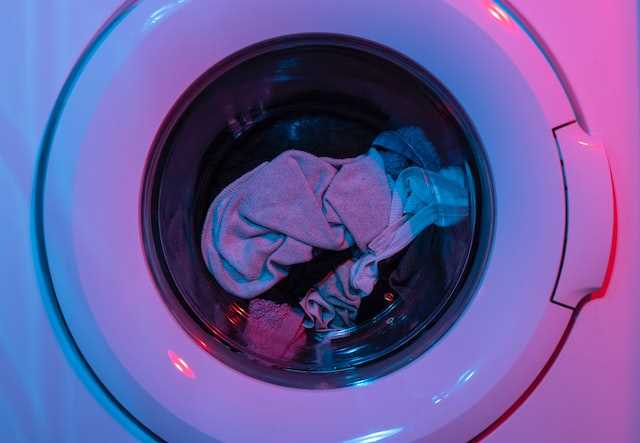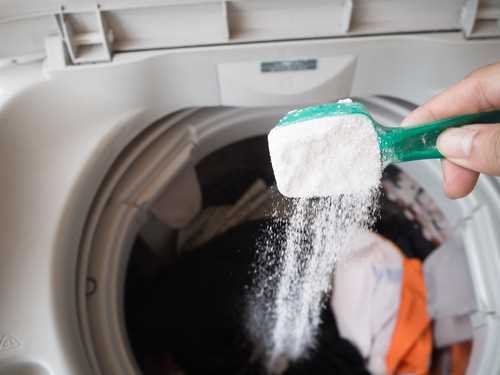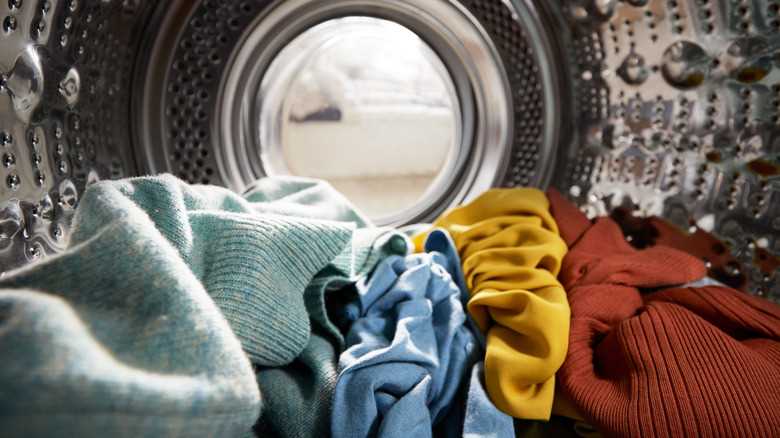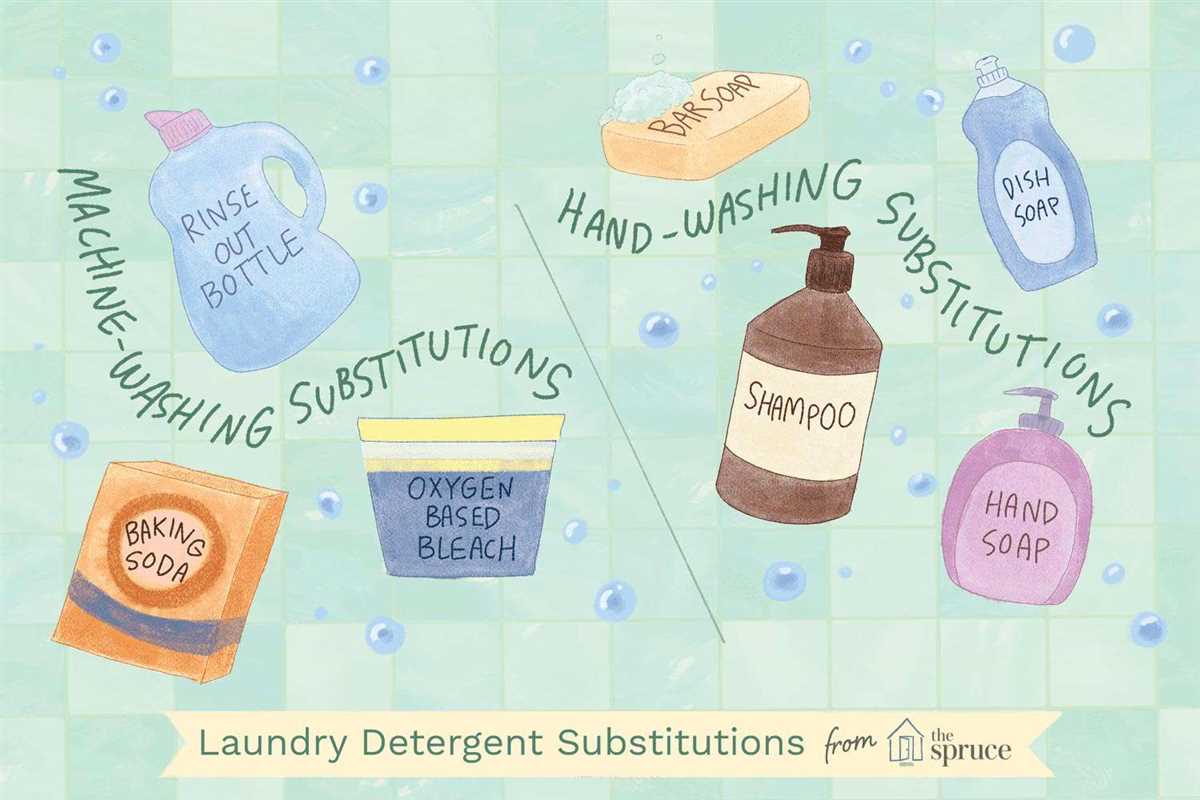




Washing our clothes is a daily chore that we often take for granted. We rely on laundry detergents to remove stains, dirt, and odours, leaving our clothes fresh and clean. But have you ever wondered what would happen if you washed your clothes without using any detergent?
In this article, we will explore the effects of washing clothes without detergent. We will discuss what happens to the cleanliness and smell of your clothes, as well as the impact on the longevity of your garments. Additionally, we will delve into the environmental and health implications of using detergent-free washing methods.
Washing clothes without detergent can result in various outcomes. Without the cleaning agents found in detergents, such as surfactants and enzymes, your clothes may not be as clean as you would like them to be. Stains and dirt may not be fully removed, leaving your clothes looking dingy and less fresh. In addition, without the fragrances found in detergents, your clothes may not have that pleasant, freshly-washed scent.
Furthermore, washing clothes without detergent can have longer-term effects on the condition of your garments. Detergents help to maintain the quality and lifespan of your clothes by removing oils, sweat, and other buildup that can lead to fabric deterioration. Without this regular cleaning, your clothes may become worn out faster, fading in color and losing their original shape.
Aside from the effects on your clothes, washing without detergent also has environmental and health implications. Many conventional laundry detergents contain chemicals that can be harmful to the environment, particularly in terms of water pollution. By exploring alternative methods of washing clothes, such as using natural cleaning agents or reducing the frequency of washing, we can minimize our impact on the planet. Additionally, for individuals with sensitive skin or allergies, using detergent-free washing methods may be a healthier option.
Understanding the Importance of Detergent in Clothes Washing
Why is detergent important?
Detergent plays a crucial role in the process of washing clothes. It is specifically designed to remove dirt, stains, and odors from garments effectively. Without detergent, the washing process may not be as effective, leaving clothes still dirty and unclean.
How does detergent work?
Detergent works by utilizing a combination of several key components. These components include surfactants, enzymes, builders, and optical brighteners. Each component performs a specific function to ensure the cleanliness and freshness of the clothes.
- Surfactants: These are the primary cleaning agents in detergent. They work by reducing the surface tension of water, allowing it to penetrate the fabric’s fibers and lift away dirt and stains.
- Enzymes: Enzymes in detergent break down protein-based stains like blood, sweat, and food. They help to loosen and remove these stains more effectively than water alone.
- Builders: Builders in detergent help to soften hard water and enhance the cleaning power of the surfactants. They also prevent dirt and minerals from redepositing onto the clothes during the washing cycle.
- Optical Brighteners: Optical brighteners are added to detergent to make clothes appear brighter and whiter. They work by absorbing ultraviolet light and emitting blue light, which counteracts the yellowish hue of fabrics.
What happens when you wash clothes without detergent?
When you wash clothes without detergent, the effectiveness of the washing process is significantly reduced. Without the cleaning agents and enzymes found in detergent, dirt, stains, and odors are not effectively removed from the clothes. As a result, the clothes may still appear dirty and have lingering odors even after washing.
Additionally, washing clothes without detergent may lead to the accumulation of bacteria and fungi in the washing machine and on the clothes themselves. Detergent helps to sanitize and disinfect the clothes, ensuring they are clean and safe to wear.
In conclusion
Detergent is a vital component when it comes to washing clothes. Its ability to remove dirt, stains, and odors, along with its sanitizing properties, make it an essential part of the laundry process. Without detergent, clothes would not be as clean, fresh, and safe to wear. So always make sure to use an appropriate amount of detergent when washing your clothes to achieve the best cleaning results.
The Role of Detergent in Removing Stains and Dirt
Detergent plays a crucial role in the process of washing clothes by helping to remove stains and dirt. When clothes are dirty, they can contain a variety of substances, such as oil, grease, dirt particles, food stains, and bodily fluids. Detergent works by breaking down and lifting these substances from the fabric, allowing them to be rinsed away during the washing process.
Detergents contain surfactants, which are compounds that have both hydrophilic (water-attracting) and hydrophobic (water-repellent) properties. These surfactants help to dissolve and loosen stains and dirt from the fabric, allowing them to be washed away more easily. The hydrophilic end of the surfactant molecule is attracted to water, while the hydrophobic end is attracted to oily and greasy substances.
The surfactants in detergent reduce the surface tension of the water, which allows it to penetrate the fabric more effectively and surround the dirt and stains. This helps to break the bond between the dirt and the fabric, making it easier to remove them during the washing process.
Detergents also contain enzymes, which are biological molecules that help to break down specific types of stains, such as protein stains (e.g., blood, sweat) and carbohydrate stains (e.g., food stains). These enzymes work by accelerating the natural chemical reactions that occur when stains are exposed to water and detergent. They help to break down the molecular structure of the stain, making it easier for the detergent to remove it.
Using detergent when washing clothes is essential for effective stain and dirt removal. Without detergent, water alone is not able to effectively break down and remove the various substances that can be found on dirty clothes. The surfactants and enzymes in detergent play a crucial role in loosening and removing stains and dirt, ensuring that clothes come out clean and fresh after each wash. It is important to choose the right detergent for the type of fabric and stains being treated to achieve the best results.
What Happens When You Wash Clothes without Detergent?
Introduction
Washing clothes without detergent can lead to several consequences. Detergent plays a crucial role in the cleaning process by removing dirt, stains, and odors from fabric. Without detergent, the effectiveness of the washing process is significantly reduced. In this article, we will explore the effects of washing clothes without detergent.
1. Ineffective Cleaning
One of the main effects of washing clothes without detergent is ineffective cleaning. Detergents contain surfactants that help break down and remove dirt, oils, and stains from the fabric. Without these surfactants, the water alone is not sufficient to remove stubborn stains and grime. As a result, the clothes may still appear dirty and have lingering odors.
2. Odor Build-up
When clothes are washed without detergent, odors may start to build up over time. Detergents are designed to remove and neutralize odors, leaving clothes smelling fresh and clean. Without detergent, the natural odors from sweat, body oils, and other sources may remain trapped in the fabric, resulting in unpleasant smells.
3. Stains Retention
Another effect of washing clothes without detergent is the retention of stains. Detergents contain enzymes and other cleaning agents that help break down and remove stains from the fabric. Without these agents, stains may not be effectively lifted from the clothes, resulting in their retention even after washing.
4. Fabric Damage

While washing clothes without detergent may not directly cause damage to the fabric itself, it can lead to fabric damage over time. Detergents help to maintain the softness and flexibility of the fabric fibers. Without detergent, the fabric may become stiff, rough, and prone to damage, such as tearing or pilling.
5. Bacteria and Germs
Detergents also play a crucial role in killing bacteria and germs that may be present on the fabric. Washing clothes without detergent may not effectively eliminate these microorganisms, potentially leading to unhygienic conditions and an increased risk of infections or skin irritations.
Conclusion

Washing clothes without detergent can have several negative effects, including ineffective cleaning, odor build-up, stain retention, fabric damage, and the presence of bacteria and germs. To ensure proper cleaning and maintenance of clothes, it is advisable to use an appropriate detergent during the washing process.
Examining the Impact on Cleaning Efficiency and Odor Removal
When washing clothes without detergent, it is important to understand the potential impact on the cleaning efficiency and odor removal. Detergents are specifically designed to remove dirt, stains, and odors from fabrics, so washing clothes without detergent may result in less effective cleaning and odor control.
Cleaning Efficiency
Detergents contain surfactants that help to break down and lift dirt and stains from fabrics. Without these surfactants, washing clothes without detergent may not remove dirt and stains as effectively.
Research has shown that washing clothes without detergent can lead to inadequate cleaning. A study conducted by the University of Arizona found that washing clothes without detergent resulted in a less effective removal of dirt and stains compared to washing with detergent.
It is important to note that the type and amount of dirt and stains on the clothes can also affect the cleaning efficiency. Light stains and dirt may be easier to remove without detergent, while heavy stains and dirt may require the use of a detergent.
Odor Removal
Detergents also play a crucial role in removing odors from clothes. They contain special ingredients that neutralize and eliminate odors, leaving the clothes smelling fresh and clean.
Washing clothes without detergent may not effectively remove odors, especially strong or deep-seated smells. Without the odor-neutralizing properties of detergents, the clothes may retain unpleasant odors even after washing.
Some individuals may try alternative methods to remove odors when washing clothes without detergent. These methods may include using vinegar, baking soda, or specialized odor removal products. However, it is important to note that these methods may not be as effective as using a detergent specifically designed for odor removal.
Conclusion
While washing clothes without detergent may be a convenient option in certain situations, it is important to consider the impact on cleaning efficiency and odor removal. Without the surfactants and odor-neutralizing properties of detergents, washing clothes without detergent may result in less effective cleaning and odor control. It is recommended to use a detergent specifically designed for cleaning and odor removal to ensure the best results.
Exploring Alternative Methods to Washing Clothes without Detergent
Introduction
Washing clothes without detergent is a topic that has gained attention in recent years due to environmental concerns and the desire for more sustainable laundry practices. While traditional detergents may contain chemicals that can be harmful to the environment and irritating to sensitive skin, exploring alternative methods can provide a gentler and eco-friendly approach to cleaning clothes.
1. Vinegar
Vinegar is a versatile household ingredient that can be used as a natural alternative to detergent. Its acidic properties help break down dirt, remove odours, and soften fabrics. To use vinegar as a detergent substitute, add half a cup of white vinegar to the washing machine during the rinse cycle. It is important to note that vinegar should not be used with bleach or hydrogen peroxide, as this can create harmful fumes.
2. Baking Soda

Baking soda is another common household item that can be used as a detergent substitute. Its alkaline nature helps remove stains and neutralize odours. To use baking soda, add one cup to the washing machine along with the clothes. Baking soda can also be used as a pre-soak, by dissolving it in water and allowing the clothes to soak before washing.
3. Soap Nuts

Soap nuts are berries that contain natural saponins, which are a type of surfactant that can naturally clean clothes. Soap nuts are a sustainable and eco-friendly alternative to traditional detergents. To use soap nuts, place a few in a small cloth bag and add them to the washing machine. They can be reused for multiple washes before losing their cleaning properties.
4. Essential Oils
Essential oils can be added to the wash cycle to provide a pleasant scent to clothes. While not a substitute for detergent, they can enhance the cleaning experience. Popular essential oils for laundry include lavender, tea tree, and lemon. Add a few drops to the detergent compartment or a cloth before adding it to the dryer for a natural and refreshing fragrance.
5. Homemade Laundry Detergent
For those looking for a more hands-on approach, making homemade laundry detergent can be a rewarding alternative. Recipes often include ingredients such as grated soap, washing soda, and borax. These homemade detergents are natural and customizable to specific cleaning needs.
Conclusion
Exploring alternative methods to washing clothes without detergent allows for more sustainable and environmentally-friendly laundry practices. Whether using vinegar, baking soda, soap nuts, essential oils, or homemade detergents, these alternatives provide a gentler and more natural approach to keeping your clothes clean and fresh.
The Benefits and Limitations of Using Natural Cleaning Agents
Natural cleaning agents have gained popularity in recent years due to their perceived benefits for both human health and the environment. While chemical-based detergents have been widely used for laundry purposes, many people are now opting for natural alternatives.
Benefits of Natural Cleaning Agents
- Environmentally Friendly: Natural cleaning agents are typically made from biodegradable ingredients, which means they break down easily and do not contribute to environmental pollution. This is in contrast to chemical detergents, which often contain harmful ingredients that can persist in the environment.
- Safer for Human Health: Many chemical-based detergents contain synthetic fragrances, dyes, and other additives that can cause skin irritation, allergies, or respiratory problems. Natural cleaning agents, on the other hand, are often made from plant-based ingredients that are gentle on the skin and less likely to cause health issues.
- Cost-Effective: Natural cleaning agents can be made from everyday household items such as baking soda, vinegar, or lemon juice. This makes them a cost-effective alternative to buying commercial detergents, especially for those on a tight budget.
- No Harsh Chemical Smells: Unlike chemical detergents, natural cleaning agents typically have a mild smell or no smell at all. This can be beneficial for those who are sensitive to strong fragrances or prefer a more subtle scent on their clothes.
Limitations of Natural Cleaning Agents
- Less Effective on Stains: While natural cleaning agents can effectively clean regular dirt and grime, they may not be as effective in removing tough stains. Chemical detergents often contain enzymes and other powerful stain-fighting ingredients that can break down and remove stains more effectively.
- May Require Pre-Treatment: In some cases, natural cleaning agents may need to be paired with pre-treatment methods, such as soaking or spot-treating, to effectively remove stains. This can add extra steps and time to the laundry process.
- Not Suitable for All Fabrics: Natural cleaning agents may not be suitable for certain delicate fabrics or materials that require specific care instructions. It is important to check the fabric care label and follow the manufacturer’s recommendations when using natural cleaning agents.
- Less foaming: Natural cleaning agents often produce less foam compared to chemical detergents, which may give the impression that they are not working as effectively. However, this is not necessarily the case, as foaming does not directly correlate with cleaning power.
In conclusion, natural cleaning agents offer several benefits such as being environmentally friendly, safer for human health, cost-effective, and free from harsh chemical smells. However, they may be less effective on tough stains, require pre-treatment, not suitable for all fabrics, and produce less foam. It is important to weigh these pros and cons when deciding whether to use natural cleaning agents for laundry purposes.
Understanding the Potential Risks of Washing Clothes without Detergent
Washing clothes without detergent may seem like a convenient solution when you run out of laundry detergent or want to save some money. However, it is important to understand the potential risks and drawbacks of washing clothes without detergent.
Ineffective Cleaning
When you wash clothes without detergent, they may not be effectively cleaned. Detergents contain surfactants that help to remove dirt, oil, sweat, and stains from fabrics. Without these surfactants, the water alone may not be able to penetrate the fabric and remove these particles completely.
Key Point: Without detergent, your clothes may not be as clean as they could be and may retain dirt, oil, and stains.
Odor and Bacteria Build-up

Detergents also help to kill bacteria and remove odors from clothes. When you wash clothes without detergent, bacteria can multiply, and odors can develop. This can lead to a foul smell emanating from your clothes.
Key Point: Washing clothes without detergent can contribute to the build-up of bacteria and unpleasant odors.
Stains and Color Fading
Certain stains, such as grease or oil stains, may require the cleaning power of detergents to be effectively removed. Washing clothes without detergent may not be able to lift these types of stains, resulting in clothes that still appear dirty or stained.
In addition, without detergent, the colors of your clothes may fade more quickly. Detergents are formulated to minimize color fading and protect the vibrancy of your clothes.
Key Point: Washing clothes without detergent may struggle to remove certain stains and can contribute to color fading.
Residue Build-up
When you wash clothes without detergent, residue from dirt, skin cells, and soap scum can build up in your washing machine. Over time, this residue can accumulate and affect the machine’s performance, causing it to work less efficiently.
Key Point: Washing clothes without detergent may lead to residue build-up in your washing machine, potentially affecting its performance.
Environmental Impact
Detergents, particularly those that contain harsh chemicals, can have a negative impact on the environment. However, washing clothes without detergent does not eliminate the environmental impact entirely. Without detergent, you may still be using excessive amounts of water and energy to wash your clothes.
Key Point: The environmental impact of washing clothes without detergent is not eliminated and may still contribute to excessive water and energy usage.
Considerations
Before deciding to wash your clothes without detergent, consider the potential risks and drawbacks. If you’re concerned about the environment, you may consider using eco-friendly detergents or exploring alternative laundry methods, such as using baking soda or vinegar.
Key Point: It is important to weigh the potential risks and actively seek alternative cleaning methods if washing clothes without detergent is not feasible for you.
| Risks | Considerations |
|---|---|
| Ineffective Cleaning | Consider using alternative cleaning methods or eco-friendly detergents. |
| Odor and Bacteria Build-up | Ensure proper ventilation and consider using natural deodorizers. |
| Stains and Color Fading | Pre-treat stains or use specialized stain removers if washing without detergent. |
| Residue Build-up | Regularly clean and maintain your washing machine for optimal performance. |
| Environmental Impact | Explore eco-friendly alternatives or reduce excessive water and energy usage. |
FAQ
What happens when you wash clothes without detergent?
When you wash clothes without detergent, the water alone is not enough to remove dirt, stains, and odours effectively. Detergents contain surfactants that help to break down and remove dirt particles from the fabric, as well as enzymes and other chemicals designed to remove stains and odours. Without detergent, the clothes may not come out as clean and fresh-smelling as they would with detergent.
Can you wash clothes effectively without detergent?
Washing clothes without detergent can clean them to some extent, as water alone can help to rinse away some dirt and debris. However, without the cleaning power of detergents, stains and odours may not be completely removed. It is recommended to use detergent for best results in terms of cleanliness and freshness of the clothes.
Are there any alternatives to detergent for washing clothes?
Yes, there are alternatives to detergent for washing clothes. Some common alternatives include using baking soda, white vinegar, or borax as natural cleaning agents. These substances can help to remove odours and stains to some extent. However, they may not provide the same level of cleaning power as commercial detergents, so it is important to adjust expectations accordingly.
Will washing clothes without detergent damage the fabric?
Washing clothes without detergent itself is unlikely to cause significant damage to the fabric. However, if the clothes have stains or odours that are not effectively removed without detergent, repeated washing without proper cleaning may lead to the stains setting in or the odour becoming more permanent. It is therefore advisable to use detergent or appropriate cleaning agents to ensure thorough cleaning and maintenance of the fabric.
Can washing clothes without detergent save money?
Washing clothes without detergent can save money in terms of not having to purchase detergent regularly. However, it is important to note that the results of washing without detergent may not be as satisfactory in terms of cleanliness and freshness. Additionally, using alternatives to detergent, such as baking soda or vinegar, may still involve some cost. Therefore, the cost savings may be minor, and it is advisable to consider the trade-off between cost and cleanliness when deciding whether to wash clothes without detergent.
Is it possible to wash clothes without using detergent?
Yes, it is possible to wash clothes without using detergent. In fact, many people choose to do so for various reasons, such as reducing exposure to chemicals or saving money on detergent.
What are the effects of washing clothes without detergent?
When washing clothes without detergent, the effectiveness of the wash can be reduced. Detergents help to remove dirt, stains, and odours from clothes, so without them, clothes may not get as clean. Additionally, detergent helps to soften the water, improving the cleaning process. Without detergent, clothes may come out stiff and less comfortable to wear.














